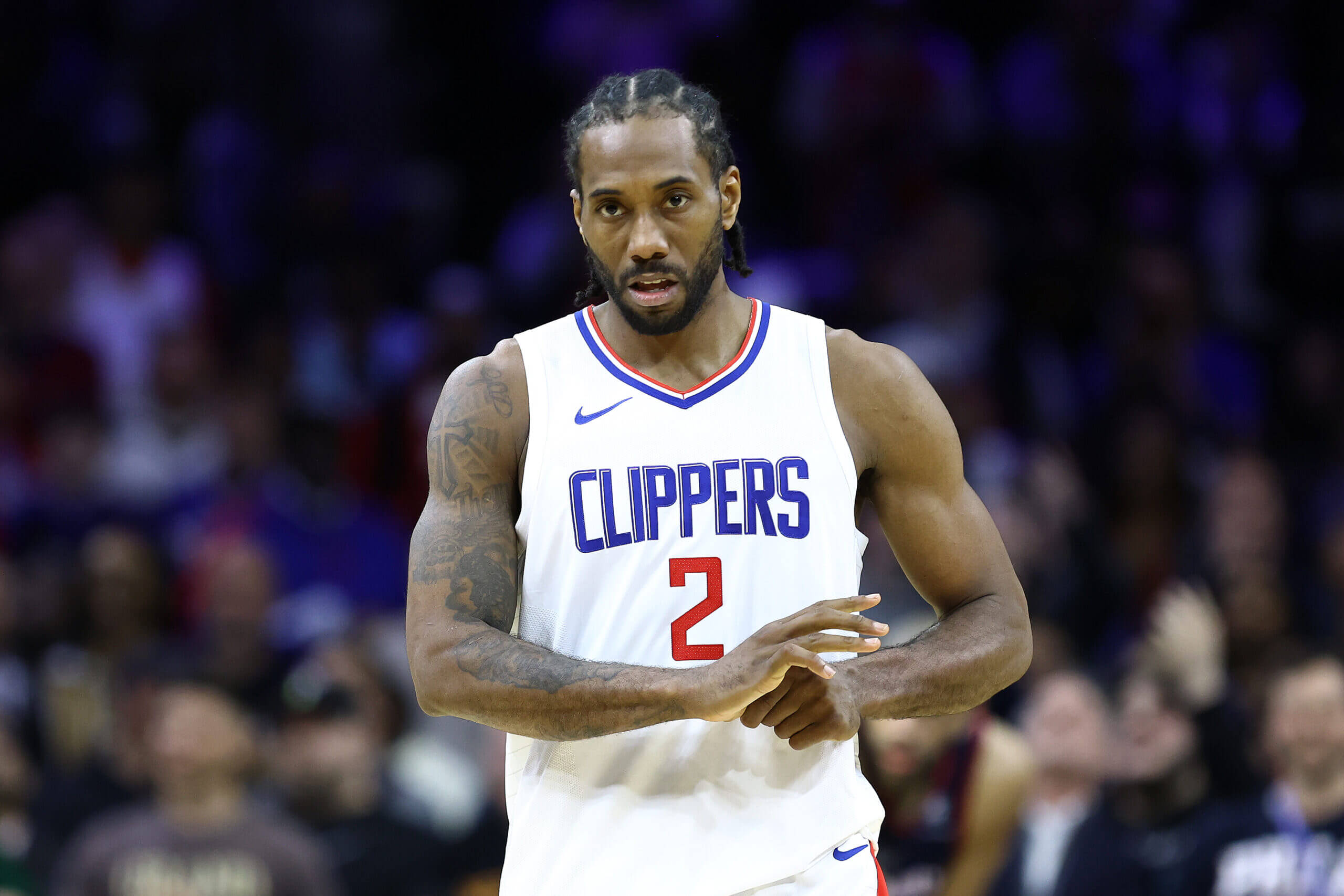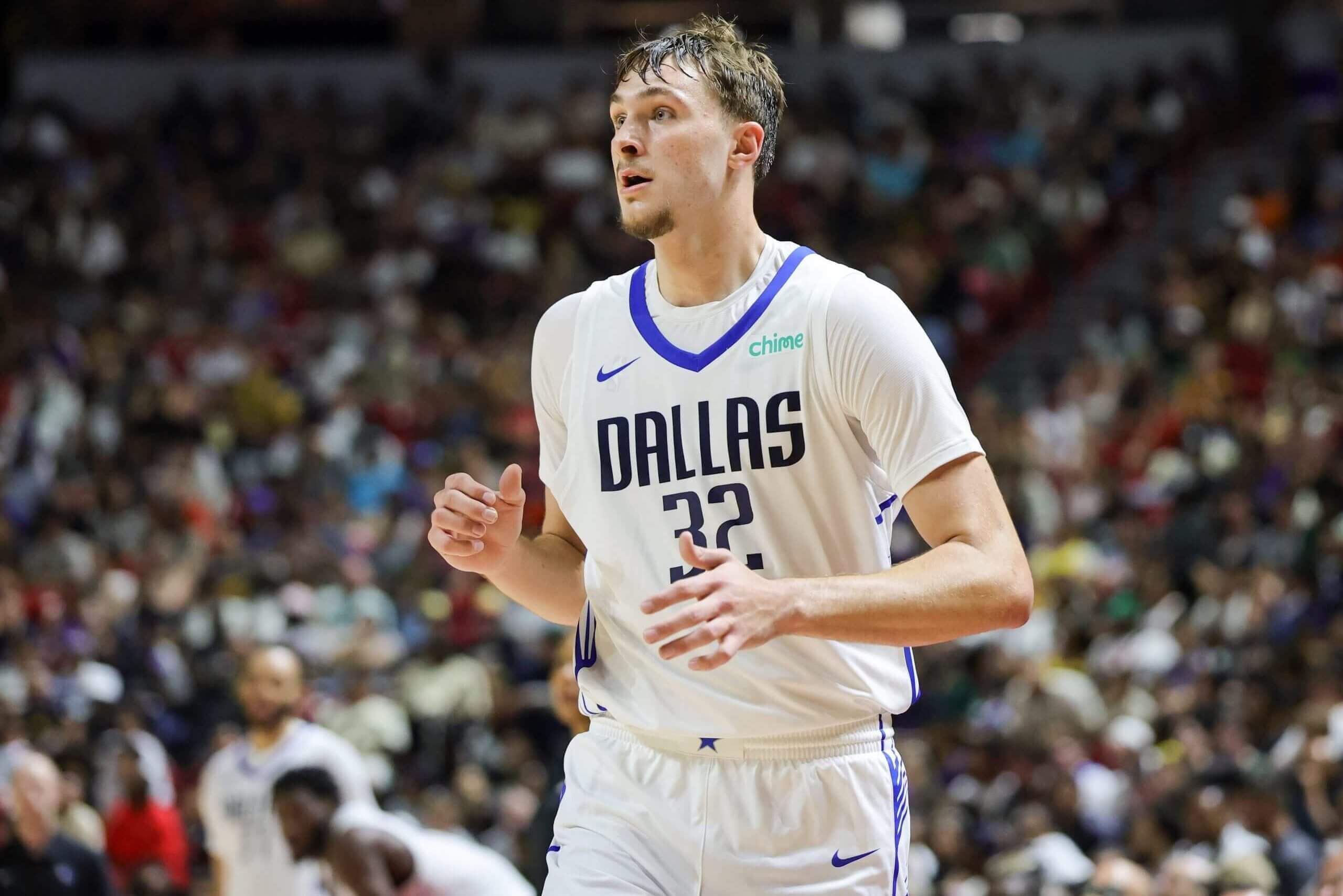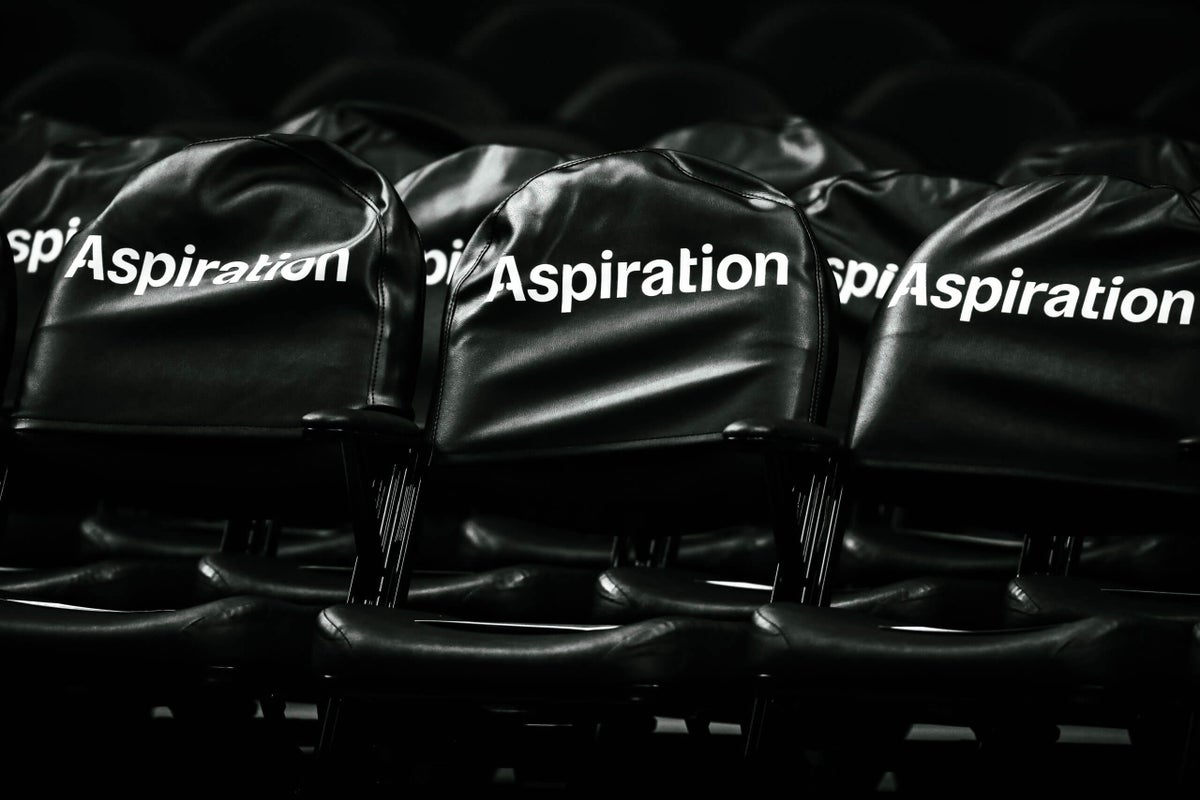In a TV commercial that first aired in March during a local broadcast of a Boston Celtics game, Jayson Tatum, the star face of the franchise, is shown seated on a podium, behind a microphone cloaked in an Amica Mutual Insurance decal. A fictitious reporter asks him, “What keeps you going?” and Tatum, with the Amica logo in plain view on screen, gives a sly look to his right before he responds, “Knowing who I do it for.”
The ad closes with a shot of three pairs of sneakers in his home, belonging to him and his two sons, followed by the slogan: “We know why you do it. So we work harder to protect it.” Tatum shoots at a mini hoop in his living room as the Amica moniker appears on the screen one last time.
Tatum’s commercial for Amica, a Celtics corporate sponsor, is fairly common around the NBA: The team’s star publicly hawking a product or service for the team’s sponsor. But the fact that there is no such ad for the LA Clippers’ Kawhi Leonard and former team sponsor Aspiration — despite the star’s $28 million endorsement contract with the company — has led to an NBA investigation for potential salary-cap violations.
A part of the Clippers’ defense since revelations surfaced that Aspiration, a Los Angeles-based environmental firm, gave Leonard such a lucrative endorsement contract for apparently no work in return, is that such deals are “not unusual” in the NBA.
The Athletic examined relationships between players on the NBA’s 29 other teams and those teams’ corporate sponsors to find out if that is true. There are cases in which a player has a separate endorsement deal with a business that is also paying millions to sponsor the star’s team — with one or two substantial asterisks.
“The issue here isn’t the cost,” said one player agent in the NBA, who was granted anonymity to discuss sensitive, private contracts. “If you heard, hypothetically, that a Michael Jordan or a Kobe Bryant had a deal to endorse (a team sponsor), whatever it cost, would you bat an eye? The issue is services rendered, and is the team an investor in the companies giving the players contracts?”
Aspiration not only agreed to sponsor the Clippers’ jerseys and arena for $300 million, but had also received a $50 million investment from team owner Steve Ballmer in September 2021 before entering into the contract with Leonard in 2022. By the end of that year, Aspiration was in deep financial trouble, had already missed a payment to Leonard and was not paying many of its vendors, according to reporting by the “Pablo Torre Finds out” podcast.
In December 2022, according to company documents reviewed by Torre’s podcast, Clippers minority owner Dennis Wong then invested $2 million in Aspiration — only for Leonard to be paid $1.75 million nine days after Wong’s funding. After Wong’s investment at the end of 2022, Ballmer invested another $10 million in Aspiration in 2023. Aspiration was in default at the time of Wong’s investment, according to company records shared with the “Pablo Torre Finds Out” podcast, and filed for bankruptcy in March of 2025. Leonard listed himself as a creditor for $7 million, which means he was claiming a debt owed to him for the final year of his contract with the company, Torre reported.
In the weeks since Torre’s podcast first unveiled the relationships between the Clippers, Ballmer, Leonard and Aspiration, no one has produced evidence of Leonard doing anything for the company.
“There’s too much fire here, it’s not just smoke,” said a second NBA player agent who was also granted anonymity to discuss sensitive, private contracts. “Seven million (annually) for a no-show deal is ridiculous.”
“An outlandish number,” said another player agent. “Typically those deals are for somewhere between $500,000 and $1 million, depending on the size of the company, the market, etc.. And you can almost always see their work.”
The Athletic asked more than 50 companies with current or former jersey sponsorships with NBA teams to disclose any endorsement deals they cut with players. The Athletic also requested basic contract details and explanations for why those arrangements are (or were) beneficial to those companies. Of the 20 jersey sponsors that responded to The Athletic’s inquiry, only five said they had ever entered into separate endorsement deals with players on the team.
In addition to Tatum, Steph Curry of the Golden State Warriors and Japanese technology conglomerate Rakuten have had a separate partnership for years that includes not only commercials but cooperation on documentaries, programs supporting Black fashion designers and community work through a foundation established by Curry and his wife, Ayesha. Also, Dallas Mavericks’ rookie Cooper Flagg and the financial technology company Chime entered into a contract days before Flagg was taken No. 1 overall by the Mavericks in the 2025 draft. Flagg’s campaign for Chime began with an appearance by Flagg and his mother on Chime’s YouTube Series, “Mama, I made it.”
Motorola — a jersey sponsor for both the Milwaukee Bucks and Chicago Bulls — said it had a separate endorsement and philanthropic deal with Jrue Holiday when he played for the Bucks, which included a TV commercial.
NewAge Products, a hardware store and the jersey sponsor for the New Orleans Pelicans, said it was working on projects with at least two players that have not been announced. A spokesman for NewAge also said the company gifted retired NBA superstar Shaquille O’Neal a full set of garage cabinetry in 2023, long after he stopped playing. Shaq recorded a thank you to NewAge and posted it to social media.
A sixth jersey sponsor, Goodyear Tires, which sponsored the Cleveland Cavaliers from 2017 through 2022, said it had “a small deal with (a player or multiple players) that never really materialized due to Covid(-19) shutdowns,” and otherwise had no separate deals with Cavs players, a company spokesman said in an email to The Athletic.
Additionally, The Athletic identified partnerships between Giannis Antetokounmpo and Johnsonville Sausage Company, which is also a corporate sponsor of the Bucks. The arrangement includes Giannis endorsing Johnsonville and the creation of a “Greek Brat” in Giannis’ honor. Damian Lillard and Toyota, a major corporate sponsor of the Portland Trail Blazers, also have a partnership that includes a Toyota dealership in Lillard’s name in Oregon.
Based on background conversations with player agents, NBA marketing representatives, team owners and chief executives, at least two of the endorsement deals were for less than the $28 million Leonard contracted for with Aspiration.
“Individual players can be traded or get hurt,” said Bill Day, a senior vice president and spokesman for Frost Bank, former jersey sponsor and current arena sponsor for the San Antonio Spurs. “We sometimes have players, or more likely, former players attend events that we sponsor, but we don’t have individual endorsements because it’s easier to build long-term relationships with the teams.”

Kawhi Leonard’s deals with team sponsor Aspiration, worth up to $48 million, shocked sources around the NBA. (Photo by Tim Nwachukwu/Getty Images)
The Athletic could not find another financial relationship between an NBA team and one of its chief sponsors similar to the one between the Clippers and Aspiration in which team ownership contributed millions of dollars to the sponsor’s coffers. While it is not unusual for team owners and team sponsors to be close — for instance, the Cleveland Cavaliers are owned by Dan Gilbert, who also owns Cavs’ arena sponsor Rocket Mortgage; and Miami Heat owner Micky Arison is the chairman of Carnival Corp, a Heat sponsor — in those cases, players on the team do not have separate endorsement deals with the team’s sponsor.
The Athletic also found a close tie between a team and its jersey sponsor in which a team’s CEO sat on the sponsor’s board of directors. Cynthia Marshall served as the chief executive for the Dallas Mavericks from 2018 to 2024 and has also been a board member for Chime, the Mavs’ jersey sponsor, since 2021. According to a recent federal Securities and Exchange Commission filing by Chime, Marshall was paid more than $230,000 in salary and stock from Chime last year.
While Chime didn’t sign a Mavericks player to an individual sponsorship deal while Marshall worked for both organizations, three league sources granted anonymity to discuss a private business proposal told The Athletic that Chime offered former Mavs star Luka Dončić a deal to become pitchman for the company in 2021, which he declined.
The Flagg deal didn’t materialize until after Marshall left her NBA position at the end of 2024, and Chime said Flagg is the first pro athlete to endorse the company.
Mavs minority owner Mark Cuban, who has publicly defended Ballmer and the Clippers, controlled the Mavs when the Chime partnership began and when Marshall, his top executive, joined the Chime board. He told The Athletic there was nothing improper about Marshall serving in dual roles.
“We want them to do well, they want us to do well,” Cuban said. “Our interests are aligned. The NBA approves the jersey deals. And they (Chime) have to disclose she is on the board.”
A spokesperson for Chime said Marshall has never as a board member voted on, or otherwise participated in, any business related to the Mavericks. The NBA also declined to comment on Marshall’s dual roles with Chime.

Dallas Mavericks rookie Cooper Flagg has a separate sponsorship deal with Chime, the team’s jersey sponsor, which is not uncommon in the NBA. But players with separate sponsorships contracts always publicly endorsed the company, according to an Athletic investigation. (Photo by Ethan Miller/Getty Images)
Partnerships between companies and the teams they sponsor already require player participation. Per the NBA’s collective bargaining agreement, players are required to appear for “reasonable promotional activities” for team sponsors upon request. Players are supposed to make at least 12 appearances each year for team sponsors. They are required to be paid $3,500 per appearance for their first eight appearances and $4,500 per appearance after that, unless the team decides to pay more “that is consistent with the team’s past practice and not otherwise unreasonable.”
When a corporate sponsor is interested in signing a player, the company may ask the NBA team it sponsors for an introduction and remove itself from any negotiation. Ballmer has said that is exactly what he did for Aspiration with Leonard, and nothing more.
One team official and one player agent, granted anonymity to share details of private business relationships between their players and corporate sponsors, discussed separate instances of teams learning about endorsement deals through phone calls from the companies asking to shoot commercials at team facilities involving the star player.
In both cases, the team official and agent said, the company was required to pay for use of the team building to avoid a hint of impropriety.
League rules stipulate that a team can be found to have used a business partner to circumvent the salary cap if the contract between the sponsor and player is “substantially in excess of the fair market value of any services to be rendered by the player,” according to the NBA’s collective bargaining agreement with players.
“We all pay attention to this,” the team official said. “Every year we have meetings with our global marketing department to understand the rules and make sure we and our players are following them.”
— The Athletic’s Sam Amick contributed.
(Seats with Aspiration covers by Icon Sportswire / Getty Images)

